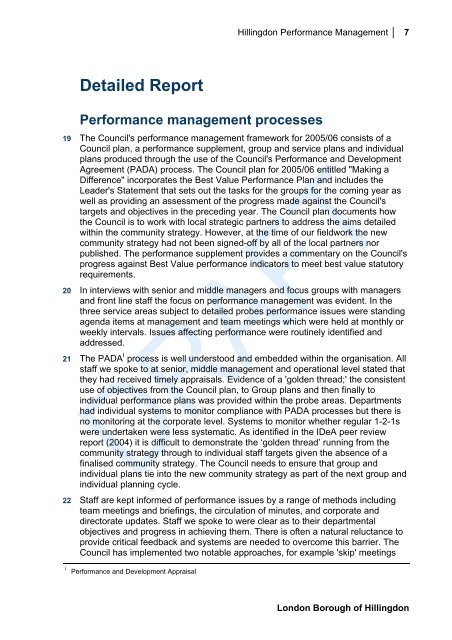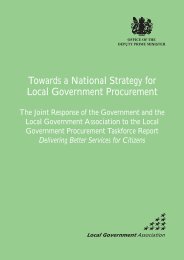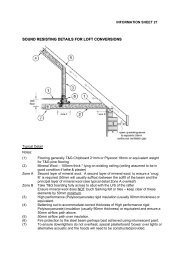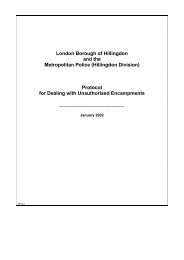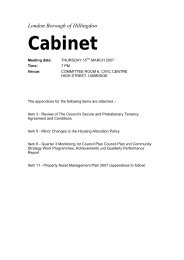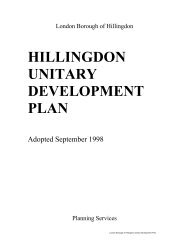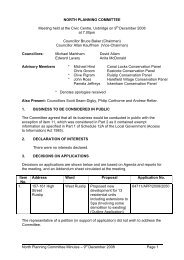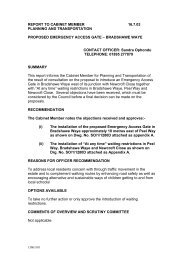Report - London Borough of Hillingdon
Report - London Borough of Hillingdon
Report - London Borough of Hillingdon
You also want an ePaper? Increase the reach of your titles
YUMPU automatically turns print PDFs into web optimized ePapers that Google loves.
<strong>Hillingdon</strong> Performance Management │ 7<br />
Detailed <strong>Report</strong><br />
Performance management processes<br />
19 The Council's performance management framework for 2005/06 consists <strong>of</strong> a<br />
Council plan, a performance supplement, group and service plans and individual<br />
plans produced through the use <strong>of</strong> the Council's Performance and Development<br />
Agreement (PADA) process. The Council plan for 2005/06 entitled "Making a<br />
Difference" incorporates the Best Value Performance Plan and includes the<br />
Leader's Statement that sets out the tasks for the groups for the coming year as<br />
well as providing an assessment <strong>of</strong> the progress made against the Council's<br />
targets and objectives in the preceding year. The Council plan documents how<br />
the Council is to work with local strategic partners to address the aims detailed<br />
within the community strategy. However, at the time <strong>of</strong> our fieldwork the new<br />
community strategy had not been signed-<strong>of</strong>f by all <strong>of</strong> the local partners nor<br />
published. The performance supplement provides a commentary on the Council's<br />
progress against Best Value performance indicators to meet best value statutory<br />
requirements.<br />
20 In interviews with senior and middle managers and focus groups with managers<br />
and front line staff the focus on performance management was evident. In the<br />
three service areas subject to detailed probes performance issues were standing<br />
agenda items at management and team meetings which were held at monthly or<br />
weekly intervals. Issues affecting performance were routinely identified and<br />
addressed.<br />
21 The PADA I process is well understood and embedded within the organisation. All<br />
staff we spoke to at senior, middle management and operational level stated that<br />
they had received timely appraisals. Evidence <strong>of</strong> a 'golden thread;' the consistent<br />
use <strong>of</strong> objectives from the Council plan, to Group plans and then finally to<br />
individual performance plans was provided within the probe areas. Departments<br />
had individual systems to monitor compliance with PADA processes but there is<br />
no monitoring at the corporate level. Systems to monitor whether regular 1-2-1s<br />
were undertaken were less systematic. As identified in the IDeA peer review<br />
report (2004) it is difficult to demonstrate the ‘golden thread’ running from the<br />
community strategy through to individual staff targets given the absence <strong>of</strong> a<br />
finalised community strategy. The Council needs to ensure that group and<br />
individual plans tie into the new community strategy as part <strong>of</strong> the next group and<br />
individual planning cycle.<br />
22 Staff are kept informed <strong>of</strong> performance issues by a range <strong>of</strong> methods including<br />
team meetings and briefings, the circulation <strong>of</strong> minutes, and corporate and<br />
directorate updates. Staff we spoke to were clear as to their departmental<br />
objectives and progress in achieving them. There is <strong>of</strong>ten a natural reluctance to<br />
provide critical feedback and systems are needed to overcome this barrier. The<br />
Council has implemented two notable approaches, for example 'skip' meetings<br />
I<br />
Performance and Development Appraisal<br />
<strong>London</strong> <strong>Borough</strong> <strong>of</strong> <strong>Hillingdon</strong>


